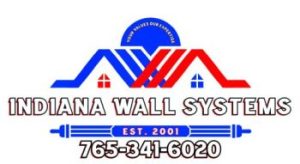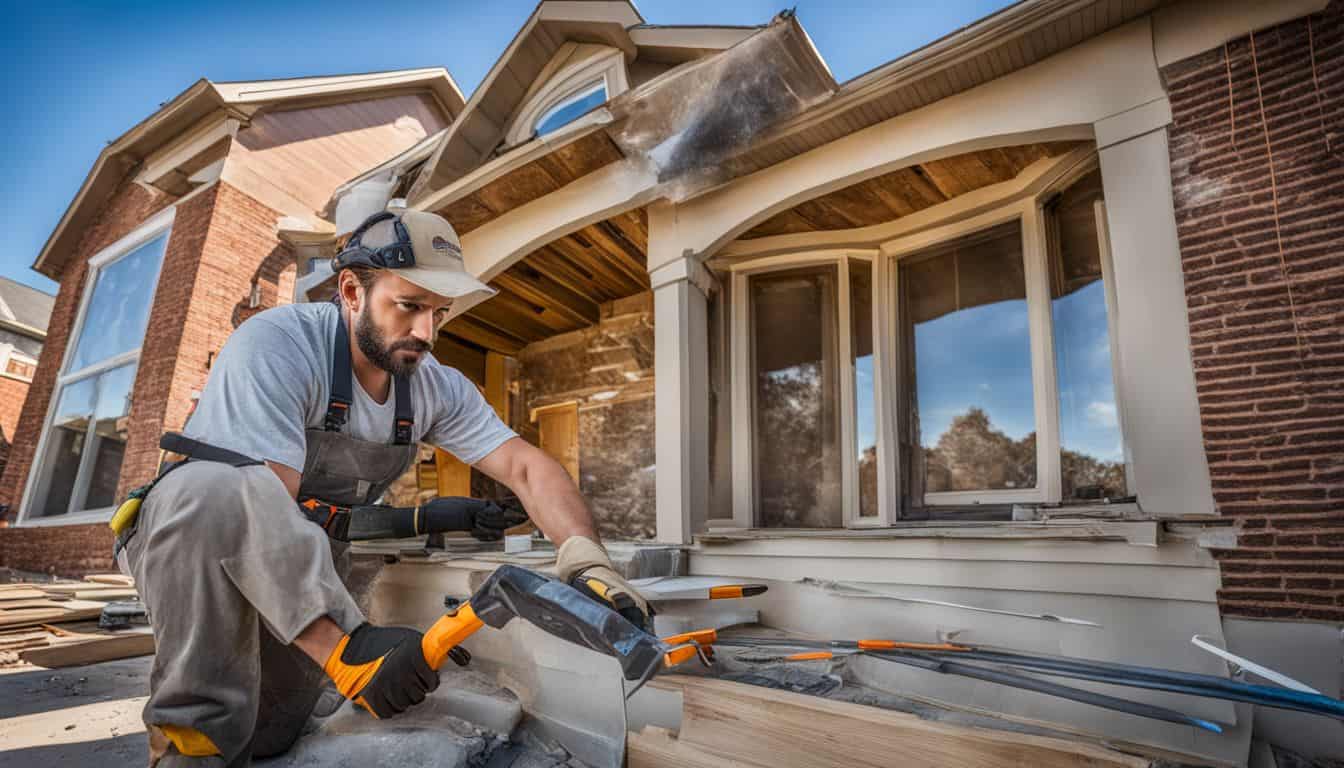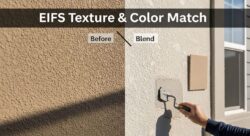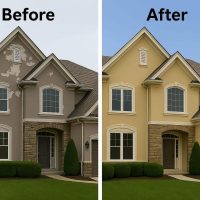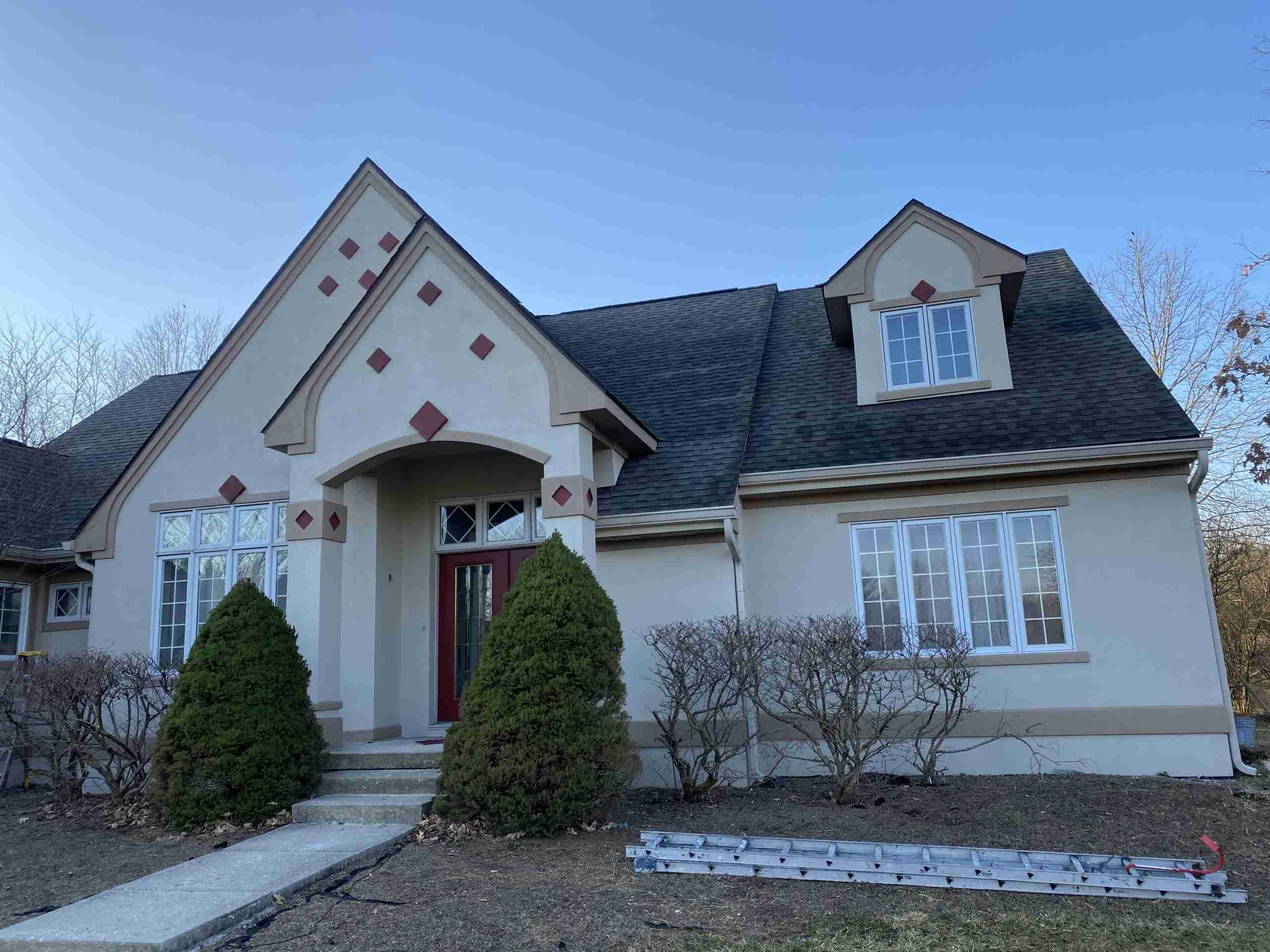The Shocking Truth Behind EIFS Contractor Differences—and What It Could Cost You
When you’re standing in your driveway, looking at your home’s exterior walls, you probably don’t think much about the complex engineering behind modern wall systems. But if you’re considering an EIFS (Exterior Insulation and Finish System) installation or repair, that casual assumption could cost you thousands of dollars and years of headaches. The harsh reality is that not all EIFS contractors are created equal, and the difference between a qualified specialist and someone who “dabbles” in synthetic stucco can make or break your entire project.
After two decades in the EIFS industry, Jeff Johnson, CEO of Indiana Wall Systems, has seen the full spectrum of contractor quality—from meticulous craftsmen who follow every manufacturer specification to weekend warriors who treat EIFS like regular paint and primer. “The gap between qualified and unqualified EIFS contractors isn’t just about skill level,” Johnson explains. “It’s about understanding that EIFS is a building envelope system that requires specialized knowledge, proper training, and respect for the science behind moisture management.”
Key Takeaways:
- Not all EIFS contractors possess the same level of training, certification, and field experience
- Proper installation techniques and adherence to EIMA guidelines separate qualified professionals from general contractors
- Moisture management and drainage plane design require specialized knowledge that impacts long-term performance
- Choosing the wrong contractor can lead to costly repairs and insurance complications down the road
- Indiana Wall Systems’ 22-year track record demonstrates the value of working with certified EIFS specialists
The Foundation of EIFS Excellence: Understanding What Sets Contractors Apart
The Training Divide That Defines Quality
The construction industry has always had its share of varying skill levels, but when it comes to EIFS installation, the stakes are significantly higher than traditional construction projects. Unlike laying brick or installing vinyl siding, EIFS requires understanding of building science principles that many general contractors never encounter in their standard training. This is why choosing the right EIFS system for your home or business requires specialized contractor expertise.
🎓 EIFS Contractor Training & Qualification Levels
Training hours reflect EIFS-specific education and certification requirements
Qualified EIFS contractors must master multiple disciplines:
- Building envelope physics and how moisture moves through wall assemblies
- Thermal dynamics and how to prevent thermal bridging
- Material science including polymer chemistry and adhesion principles
- Weather-resistant barrier integration and air sealing techniques
- Flashing design for complex architectural features
The EIFS Industry Members Association (EIMA) has established comprehensive training programs specifically because standard construction knowledge isn’t sufficient. Yet many contractors attempt EIFS projects without completing these specialized programs, relying instead on general construction experience that simply doesn’t translate to the unique requirements of synthetic stucco systems.
Why Generic Construction Experience Falls Short
Jeff Johnson frequently encounters properties where well-meaning but unqualified contractors have attempted EIFS installations. “Last month, we evaluated a commercial building in Indianapolis where a general contractor had installed what looked like perfect EIFS,” Johnson recalls. “But when we tested the wall assembly, we found multiple moisture intrusion points because they didn’t understand drainage plane design. The building owner now faces a complete remediation project that will cost three times the original installation.”
This scenario repeats across Central Indiana because many contractors assume that EIFS installation is simply “thick stucco with foam.” Understanding the differences between EIFS and traditional stucco is crucial for proper installation. This fundamental misunderstanding leads to:
- Improper substrate preparation that compromises adhesion
- Inadequate flashing details around windows and penetrations
- Incorrect base coat thickness that affects impact resistance
- Poor mesh placement that creates weak spots in the system
- Sealant joint failures from incompatible materials
The Insurance Industry’s Wake-Up Call
The insurance industry has taken notice of EIFS-related problems, particularly those stemming from poor contractor selection. Many general liability policies now include specific language regarding EIFS exposure, and some insurers require additional documentation when covering EIFS-clad buildings.
Insurance underwriters have identified key risk factors:
- Contractor qualifications and certification status
- Installation methodology and adherence to manufacturer specifications
- Quality control processes during installation
- Post-installation inspection and documentation practices
- Maintenance protocols and ongoing system monitoring
“We work closely with insurance providers to ensure our installations meet their requirements,” notes Johnson. “But we’ve seen too many cases where property owners discovered their EIFS-related claims were denied because their contractor couldn’t demonstrate proper qualifications or installation procedures.”
The Hidden Complexity of EIFS Systems
Understanding Barrier vs. Drainage EIFS
One of the most critical decisions in any EIFS project involves selecting between barrier EIFS and drainage EIFS systems. This choice requires understanding local climate conditions, building design, and performance expectations—knowledge that separates qualified specialists from general contractors.
Barrier EIFS Systems:
- Rely on the finish coat to prevent water penetration
- Require perfect installation with no defects
- Typically used in controlled environments or specific climatic zones
- Demand exceptional attention to detail at every penetration
Drainage EIFS Systems:
- Include a drainage plane behind the insulation board
- Manage moisture that penetrates the outer finish
- Provide a safety factor for real-world conditions
- Require understanding of cavity drainage principles
Many unqualified contractors don’t understand these distinctions and may select the wrong system type for a specific application. Understanding the differences between EIFS systems is crucial for long-term performance, as is proper EIFS repair when issues arise.
The Science Behind Moisture Management
Moisture management represents the most complex aspect of EIFS design and installation. Unlike traditional wall systems that rely primarily on exterior barriers, EIFS must manage moisture through multiple mechanisms:
💧 EIFS Moisture Management System Hierarchy
Primary Moisture Control:
- Weather-resistant barriers that prevent bulk water intrusion
- Air sealing to eliminate convective moisture transport
- Vapor management to control diffusion through wall assemblies
Secondary Moisture Control:
- Drainage systems to remove any water that bypasses primary barriers
- Drying mechanisms to eliminate trapped moisture
- Monitoring systems to detect moisture problems early
Tertiary Moisture Control:
- Backup drainage paths for extreme weather events
- Compartmentalization to limit damage if primary systems fail
- Access panels for inspection and maintenance
Advanced Installation Techniques
Professional EIFS contractors employ sophisticated installation techniques that go far beyond basic application methods. These expert EIFS tips for flawless installation include:
Substrate Preparation Excellence:
- Moisture content verification using calibrated meters
- Surface preparation to ensure proper adhesion
- Priming protocols for different substrate materials
- Dimensional stability assessment for substrate movement
System Integration Mastery:
- Flashing integration that maintains system continuity
- Penetration detailing for electrical, plumbing, and HVAC systems
- Expansion joint design to accommodate building movement
- Transition detailing where EIFS meets other materials
Quality Control Implementation:
- Daily installation checklists for each system component
- Progressive inspection at critical installation milestones
- Material verification to ensure compatibility
- Environmental monitoring for optimal installation conditions
Red Flags: Identifying Unqualified EIFS Contractors
🚩 Contractor Red Flags Warning System
Warning Signs That Should Concern Property Owners
Jeff Johnson has developed a keen eye for identifying contractors who lack proper EIFS qualifications. “Within the first five minutes of a conversation, I can usually tell whether a contractor really understands EIFS or is just winging it,” he explains.
Major Red Flags Include:
Training and Certification Gaps:
- Cannot provide manufacturer certification documentation
- Lacks EIMA membership or training certificates
- No continuing education records for EIFS-specific updates
- Unable to explain ASTM standards relevant to EIFS installation
Technical Knowledge Deficiencies:
- Confuses barrier and drainage EIFS system requirements
- Cannot explain thermal bridging prevention strategies
- Lacks understanding of vapor permeability requirements
- Unfamiliar with ICC-ES evaluation reports for EIFS products
- Doesn’t recognize the warning signs that EIFS needs repair
Installation Practice Problems:
- Proposes mixing components from different manufacturers
- Skips substrate moisture testing before installation
- Rushes through preconstruction planning meetings
- Cannot provide detailed installation timeline with weather contingencies
Business Practice Concerns:
- Insurance exclusions for EIFS work in their policies
- No warranty documentation for completed projects
- Lack of reference projects with similar scope and complexity
- Pricing significantly below market rates for similar work
Questions Every Property Owner Must Ask
Before hiring any contractor for EIFS work, Johnson recommends asking these critical questions:
Qualification Verification:
- “What specific EIFS training have you completed in the last two years?”
- “Can you provide manufacturer certification numbers for verification?”
- “How many EIFS projects have you completed in the last 12 months?”
- “What percentage of your annual revenue comes from EIFS work?”
Technical Competency Assessment: 5. “How do you determine whether to use barrier or drainage EIFS?” 6. “What moisture testing procedures do you follow before installation?” 7. “How do you handle thermal bridging at structural connections?” 8. “What backup plans do you have for adverse weather during installation?”
Business Reliability Evaluation: 9. “Can you provide references from clients with similar project scope?” 10. “What warranty do you offer on both materials and workmanship?” 11. “How do you handle change orders and project modifications?” 12. “What insurance coverage do you carry specifically for EIFS work?”
The Indiana Wall Systems Approach: Setting the Gold Standard
Two Decades of EIFS Mastery
Indiana Wall Systems didn’t stumble into EIFS expertise—the company was built around it. Over 22 years in the EIFS business, Johnson and his team have developed an approach that sets them apart from general contractors who occasionally work on EIFS projects.
“When we started Indiana Wall Systems, EIFS was still relatively new in Central Indiana,” Johnson recalls. “We made the decision early on to specialize rather than treat EIFS as just another service offering. That focus has allowed us to develop expertise that general contractors simply can’t match.”
The Indiana Wall Systems Difference:
Comprehensive Training Investment:
- 160 years of combined team experience in EIFS installation and repair
- Annual training updates with major EIFS manufacturers
- AWCI certification for key team members
- Specialized equipment designed specifically for EIFS work
Project Scope Expertise:
- Commercial installations up to 300,000 square feet
- Residential applications from small repairs to complete home cladding
- Historic building integration requiring specialized techniques
- Remediation projects for moisture-damaged systems
Quality Assurance Systems:
- Third-party inspection capabilities for complex projects
- Comprehensive documentation of all installation phases
- Material verification processes for every component
- Post-installation monitoring services for critical buildings
Advanced Problem-Solving Capabilities
The true test of EIFS contractor expertise comes when projects present unusual challenges. Johnson’s team regularly handles scenarios that would stump less experienced contractors:
Complex Architectural Integration:
- Cathedral ceiling assemblies requiring specialized insulation strategies
- Curved surfaces that demand custom mesh placement techniques
- Multi-story buildings with complex flashing requirements
- Mixed-material facades integrating EIFS with stone, brick, or metal
Challenging Environmental Conditions:
- High-wind exposure requiring enhanced attachment methods
- Severe freeze-thaw cycles demanding specific material selections
- High-moisture environments needing robust drainage design
- Seismic considerations for buildings in earthquake-prone areas
Specialized Building Types:
- Healthcare facilities with strict hygiene requirements
- Educational buildings requiring enhanced impact resistance
- Hospitality properties demanding rapid installation schedules
- Industrial facilities with chemical exposure concerns
For property managers overseeing these complex projects, working with experienced EIFS contractors becomes even more critical.
The Real Cost of Contractor Selection
Understanding True Project Costs
When evaluating EIFS contractors, many property owners focus primarily on initial bid prices. However, Jeff Johnson emphasizes that life-cycle cost analysis provides a more accurate picture of project value.
Initial Investment Comparison:
| Contractor Type | Typical Bid Range | Training Investment | Risk Profile |
|---|---|---|---|
| Certified EIFS Specialist | $12-18/sq ft | $15,000+ annually | Low Risk |
| Experienced General Contractor | $10-15/sq ft | $2,000-5,000 annually | Medium Risk |
| Basic Stucco Contractor | $8-12/sq ft | Minimal EIFS training | High Risk |
| Handyman/DIY Approach | $5-8/sq ft | No formal training | Very High Risk |
Note: While certified specialists may cost more upfront, their expertise significantly reduces long-term risk and potential remediation costs.
20-Year Performance Projections:
Professional Installation Benefits:
- Warranty protection covering both materials and workmanship
- Energy savings of 20-40% compared to traditional wall systems
- Minimal maintenance requirements with proper installation
- Insurance coverage without EIFS-related exclusions
- Property value protection through proven performance
Amateur Installation Consequences:
- Multiple repair cycles averaging $3,000-8,000 each
- Energy efficiency losses from thermal bridging and air leakage
- Insurance claim denials due to improper installation
- Property value decline from visible moisture damage
- Complete system replacement potentially required within 10-15 years
Case Study: The True Cost of Poor Contractor Selection
💰 Real Cost Analysis: Professional vs. Amateur Installation
This case study shows why the lowest bid often becomes the highest cost.
Johnson recently evaluated a residential property in Carmel where the homeowner had initially hired an unqualified contractor to save money on their EIFS installation.
Original Project Details:
- Property size: 3,200 square foot home
- Initial contractor bid: $28,000 (significantly below market)
- Project timeline: 3 weeks
- Warranty offered: 1 year on workmanship only
Problems Discovered Within 18 Months:
- Moisture intrusion at multiple window penetrations
- Base coat delamination due to improper mesh placement
- Thermal bridging causing energy efficiency losses
- Sealant joint failures from incompatible materials
Remediation Costs:
- Emergency moisture remediation: $8,500
- Structural repairs to damaged framing: $12,000
- Complete EIFS replacement: $45,000
- Additional costs (temporary housing, content protection): $6,500
- Total remediation cost: $72,000
“The homeowner thought they were saving $15,000 by choosing the low bid,” Johnson explains. “Instead, they ended up spending $44,000 more than our original proposal, plus dealing with months of construction disruption and the stress of potential structural damage.”
Industry Standards and Professional Excellence
ASTM Standards and EIMA Guidelines
Professional EIFS contractors operate according to established industry standards that ensure consistent quality and performance. These standards aren’t suggestions—they represent the accumulated wisdom of decades of EIFS research and field experience.
Key Industry Standards:
ASTM E2568 – Standard Practice for Application of EIFS:
- Installation procedures for all system components
- Quality control requirements during application
- Material storage and handling protocols
- Weather limitations for installation activities
EIMA Guidelines for Proper Installation:
- Substrate preparation requirements for different materials
- Flashing integration techniques for various building types
- Sealant selection and application procedures
- Inspection protocols for quality verification
International Building Code Requirements:
- Continuous insulation mandates for energy efficiency
- Fire resistance ratings for different occupancy types
- Wind load resistance calculations for high-exposure areas
- Accessibility requirements for maintenance and inspection
Manufacturer Specifications and Support
Indiana Wall Systems maintains direct relationships with leading EIFS manufacturers, ensuring access to the latest technical information and installation guidance.
Manufacturer Partnership Benefits:
- Real-time technical support for complex installation challenges
- Product training updates for new materials and techniques
- Warranty backing for properly installed systems
- Quality assurance programs for certified contractors
Major EIFS Manufacturers:
- Dryvit Systems – Premium synthetic stucco solutions
- BASF Wall Systems – Advanced polymer technologies
- Parex USA – European-engineered EIFS products
- STO Corp – High-performance wall systems
Quality Control: The Difference Between Good and Great
✅ Professional EIFS Quality Control Timeline
Systematic Quality Assurance
Quality control in EIFS installation goes far beyond basic workmanship—it requires systematic processes that ensure every aspect of the installation meets or exceeds manufacturer specifications.
Pre-Installation Quality Control:
Material Verification:
- Manufacturer certification for all system components
- Compatibility testing for mixed-manufacturer systems
- Storage condition verification to prevent material degradation
- Expiration date monitoring for time-sensitive products
Environmental Assessment:
- Weather forecasting for optimal installation conditions
- Substrate moisture testing using calibrated equipment
- Surface preparation verification according to ASTM standards
- Temperature monitoring for material application windows
Installation Phase Quality Control:
Daily Inspection Protocols:
- Base coat thickness verification using wet-film gauges
- Mesh placement documentation with photographic records
- Adhesion testing at representative locations
- Joint sealing inspection for continuity and compatibility
Progressive Quality Verification:
- First-lift inspection before proceeding to subsequent areas
- Flashing integration verification at all penetrations
- Drainage system testing where applicable
- Finish coat application monitoring for uniform thickness
Post-Installation Quality Assurance:
Final Inspection Procedures:
- Complete system inspection using standardized checklists
- Water penetration testing where specified
- Thermal imaging to identify potential issues
- Documentation completion for warranty activation
Technology Integration for Superior Results
Indiana Wall Systems leverages advanced technology to ensure installation quality that exceeds industry standards:
Diagnostic Equipment:
- Infrared thermography for thermal bridging detection
- Moisture meters for substrate condition verification
- Digital thickness gauges for precise material application
- Weather monitoring stations for optimal installation timing
Documentation Systems:
- Digital photography of all installation phases
- GPS mapping of building features and penetrations
- Quality control databases for trend analysis
- Client portals for real-time project monitoring
The Future of EIFS Contracting Excellence
Emerging Technologies and Techniques
The EIFS industry continues evolving with new technologies and techniques that require ongoing education and investment from contractors. Forward-thinking contractors like Indiana Wall Systems invest in staying ahead of these developments:
Building Information Modeling (BIM) Integration:
- 3D modeling for complex architectural features
- Clash detection to identify potential installation conflicts
- Material optimization through precise takeoff calculations
- Installation sequencing for improved efficiency and quality
Advanced Materials Science:
- Nano-technology coatings for enhanced durability
- Phase-change materials for thermal mass applications
- Smart materials that respond to environmental conditions
- Recycled content materials for sustainability goals
Installation Technology Improvements:
- Robotic application systems for large-scale projects
- Drone inspection for high-elevation quality verification
- Augmented reality for installation guidance and training
- IoT sensors for real-time performance monitoring
Sustainability and Environmental Responsibility
Modern EIFS contractors must understand environmental impact and sustainability considerations that go beyond basic installation requirements:
Energy Performance Optimization:
- Thermal bridging elimination for maximum R-value retention
- Air sealing excellence to minimize energy losses
- Solar heat gain management through proper material selection
- Whole-building energy modeling for optimal performance
Environmental Impact Reduction:
- Low-VOC materials for improved indoor air quality
- Recyclable components for end-of-life considerations
- Local sourcing to reduce transportation impacts
- Waste minimization through precise material planning
Resilience and Durability:
- Climate change adaptation for extreme weather events
- Maintenance planning for long-term performance
- Monitoring systems for early problem detection
- Upgrade pathways for future technology integration
Making the Right Choice: Your EIFS Contractor Decision
Due Diligence Framework
Selecting the right EIFS contractor requires systematic evaluation that goes beyond price comparison. Johnson recommends a comprehensive approach:
Phase 1: Initial Qualification Screening
- License verification with state and local authorities
- Insurance confirmation including EIFS-specific coverage
- Certification validation with manufacturer organizations
- Reference collection from recent, similar projects
Phase 2: Technical Competency Assessment
- Portfolio review of completed EIFS projects
- Site visit to observe ongoing installation quality
- Technical interview covering EIFS-specific knowledge areas
- Proposal evaluation for technical accuracy and completeness
Phase 3: Business Reliability Verification
- Financial stability assessment through credit reporting
- Subcontractor relationships and quality control procedures
- Change order policies and dispute resolution methods
- Communication protocols for project updates and issues
Working with Indiana Wall Systems
When you choose Indiana Wall Systems for your EIFS project, you’re not just hiring a contractor—you’re partnering with Central Indiana’s leading EIFS specialists.
The Indiana Wall Systems Experience:
Comprehensive Project Planning:
- Initial consultation to understand your specific needs and goals
- Technical evaluation of your building and environmental conditions
- System recommendation based on performance requirements and budget
- Detailed proposal with complete scope, timeline, and warranty information
Expert Installation:
- Manufacturer-certified installers for all system components
- Quality control protocols throughout every installation phase
- Real-time communication with project updates and milestone completion
- Problem-solving expertise for unexpected challenges or discoveries
Long-term Partnership:
- Comprehensive warranty covering both materials and workmanship
- Maintenance guidance to maximize system lifespan and performance
- Inspection services to monitor system condition over time
- Upgrade consultation when building needs change or technology advances
Regional Expertise:
- Central Indiana climate understanding for optimal system selection
- Local building code expertise for compliance and permitting
- Regional supplier relationships for material availability and support
- Community reputation built on 22 years of excellence
Whether you’re in Fishers, Greenwood, or Plainfield, Indiana Wall Systems provides consistent quality and local expertise.
Frequently Asked Questions
How can I verify an EIFS contractor’s qualifications?
Request manufacturer certification documents and verify them directly with the manufacturer. Check references from recent projects similar to yours, and confirm insurance coverage that specifically includes EIFS work without exclusions. Professional contractors welcome this scrutiny.
What’s the difference between barrier and drainage EIFS systems?
Barrier EIFS relies entirely on the finish coat to prevent water entry and requires perfect installation with zero defects. Drainage EIFS includes a drainage plane behind the insulation that manages any moisture penetrating the outer finish, providing better real-world performance.
How long should a quality EIFS installation last?
With proper installation by qualified contractors and regular maintenance, EIFS systems typically perform well for 25-30 years or longer. Many systems exceed their expected lifespan when installed according to manufacturer specifications.
Can any stucco contractor work on EIFS systems?
While traditional stucco experience provides some relevant skills, EIFS installation requires specific training in building science, moisture management, and system integration that most stucco contractors lack. The installation techniques and materials are fundamentally different.
What should I expect to pay for professional EIFS installation?
Quality EIFS installation typically costs $12-18 per square foot depending on project complexity, system type, and regional factors. While this exceeds basic stucco pricing, the superior performance, energy savings, and longevity justify the investment.
How do I know if EIFS problems are due to poor installation?
Common installation-related issues include soft spots indicating moisture intrusion, visible cracks at system joints, energy efficiency problems, and premature finish coat failure. Professional inspection using moisture meters and thermal imaging can determine root causes.
Why do EIFS contractors’ prices vary so much?
Price variations reflect differences in contractor qualifications, system specifications, warranty coverage, and installation quality. Extremely low bids often indicate shortcuts in materials, training, or installation procedures that compromise long-term performance.
What warranty should I expect from a professional EIFS contractor?
Professional EIFS contractors typically offer 5-10 year warranties on workmanship, plus manufacturer warranties on materials. Indiana Wall Systems provides comprehensive warranty coverage that demonstrates confidence in installation quality.
Ready to ensure your EIFS project succeeds with qualified expertise?
Don’t let contractor selection become your project’s weakest link. Indiana Wall Systems brings 22 years of specialized EIFS knowledge to every installation, from comprehensive moisture management to advanced thermal performance optimization.
Contact Indiana Wall Systems today:
- Phone: (765) 341-6020 for immediate consultation
- Service Areas: Carmel, Fishers, Indianapolis, Zionsville, and throughout Central Indiana
📍 Indiana Wall Systems Service Coverage Area
Professional EIFS installation and repair throughout the greater Indianapolis metropolitan area
Our certified specialists will evaluate your project requirements and provide detailed recommendations based on two decades of EIFS expertise. From initial consultation through final inspection, Indiana Wall Systems delivers the specialized knowledge and proven performance your EIFS project deserves.
Schedule your free consultation and discover why discerning property owners throughout Central Indiana trust Indiana Wall Systems for their most important EIFS projects. When precision matters and performance counts, choose the contractors who have built their reputation on getting it right the first time.
